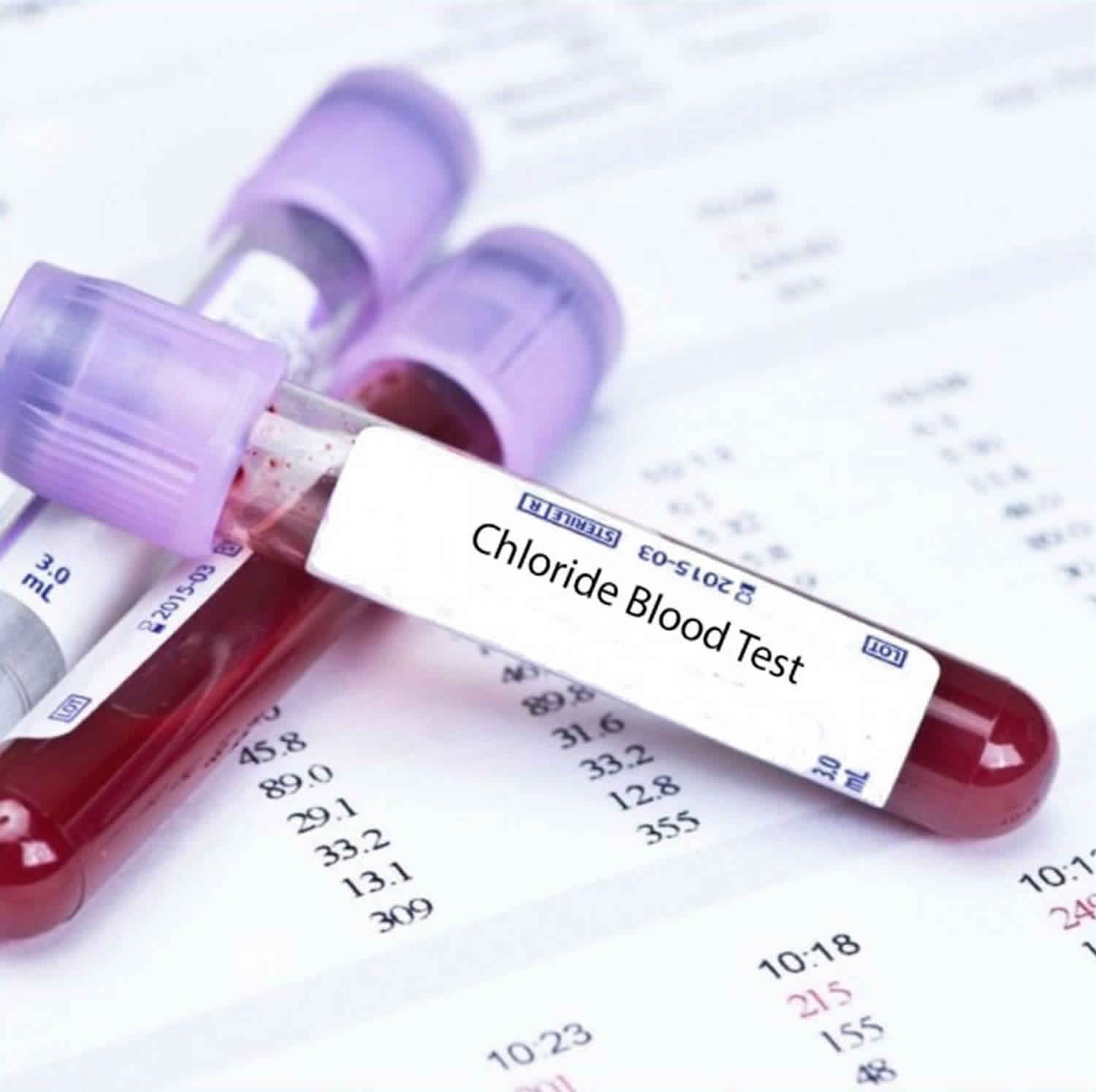What does chloride mean in a blood test
Chloride blood test measures the amount of chloride in your blood. Chloride is an electrolyte and chloride is a negatively charged ion that works with other electrolytes, such as potassium, sodium, carbon dioxide (CO2) and bicarbonate, to help regulate the amount of fluid in your body and maintain the acid-base balance. A chloride blood test is used to detect abnormal concentrations of chloride. Chloride blood test is often ordered, along with other electrolytes, as part of a regular physical to screen for a variety of conditions. Your urine also contains some chloride. Your health care provider may recommend a urine chloride test in addition to the chloride blood test to get more information about your chloride levels.
Chloride is present in all body fluids but is found in the highest concentration in the blood and in the fluid outside of the body’s cells. Most of the time, chloride concentrations mirror those of sodium, increasing and decreasing for the same reasons and in direct relationship to sodium. When there is an acid-base imbalance, however, blood chloride levels can change independently of sodium levels as chloride acts as a buffer. It helps to maintain electrical neutrality at the cellular level by moving into or out of the cells as needed.
You get chloride in your diet through food and table salt, which is made up of sodium and chloride ions. Most Americans probably consume more than necessary chloride, in the form of table salt and salt in prepared foods. Chloride is also found in many vegetables and in foods such as salted meats, butter, tomatoes, lettuce, celery, and olives. Most of the chloride is absorbed by your digestive tract, and the excess is eliminated in urine. The normal blood level remains steady, with a slight drop after meals (because the stomach produces acid after eating, using chloride from blood).
Chloride and electrolyte tests may be ordered to help diagnose the cause of signs and symptoms such as prolonged vomiting, diarrhea, weakness, and difficulty breathing (respiratory distress). If an electrolyte imbalance is detected, a healthcare practitioner will look for and address the underlying disease, condition, or medication causing the imbalance and may order electrolyte testing at regular intervals to monitor the effectiveness of treatment. If an acid-base imbalance is suspected, your healthcare practitioner may also order tests for blood gases to further evaluate the severity and cause of the imbalance.
In persons with too much base, urine chloride measurements can tell the healthcare practitioner whether the cause is loss of salt (in cases of dehydration, vomiting, or use of diuretics, where urine chloride would be very low) or an excess of certain hormones such as cortisol or aldosterone that can affect electrolyte elimination.
If your blood chloride levels are not in the normal range, it doesn’t necessarily mean you have a medical problem needing treatment. Many factors can affect your chloride levels. If you have taken in too much fluid or have lost fluid because of vomiting or diarrhea, it can affect your chloride levels. Also, certain medicines such as antacids can cause low blood chloride. In addition, swallowing large amounts of baking soda can also cause low blood chloride. To learn what your chloride results mean, talk to your health care provider.
The same treatment used to treat sodium imbalances (diuretics, fluid replacement) may be used to treat chloride imbalances.
When is chloride blood test ordered?
The blood chloride test is almost never ordered by itself. It is usually ordered as part of an electrolyte panel, a basic metabolic panel, or a comprehensive metabolic panel, which are ordered frequently as part of a routine physical.
Chloride, as part of an electrolyte or metabolic panel, may be ordered when acidosis or alkalosis is suspected or when someone has an acute condition with symptoms that may include the following:
- Prolonged vomiting and/or diarrhea
- Weakness, fatigue
- Difficulty breathing (respiratory distress)
Electrolytes may be ordered at regular intervals when a person has a disease or condition or is taking a medication that can cause an electrolyte imbalance. Electrolyte panels or basic metabolic panels are commonly used to monitor treatment of certain problems, including high blood pressure (hypertension), heart failure, and liver and kidney disease.
A urine chloride test may be performed along with a blood or urine sodium when evaluating the cause of low or high blood chloride levels. A healthcare practitioner will look at whether the chloride measurement changes mirror those of the sodium. This helps the healthcare practitioner determine if there is also an acid-base imbalance and helps to guide treatment.
Why do I need a chloride blood test?
Your health care provider may have ordered a chloride blood test as part of an electrolyte panel, which is a routine blood test. An electrolyte panel is a test that measures chloride and other electrolytes, such as potassium, sodium, and bicarbonate. You may also need a chloride blood test if you have symptoms of an acid or fluid imbalance, including:
- Vomiting over a long period of time
- Diarrhea
- Fatigue
- Weakness
- Dehydration
- Trouble breathing
Chloride blood test normal range
A typical chloride blood test normal range is 96 to 106 milliequivalents per liter (mEq/L) or 96 to 106 millimoles per liter (millimol/L).
Normal value ranges may vary slightly among different laboratories. Talk to your healthcare provider about the meaning of your specific chloride test results.
The example above shows the common measurement range for results for chloride blood tests. Some laboratories use different measurements or may test different specimens.
What does high chloride mean in blood test?
An increased level of blood chloride is called hyperchloremia. High chloride blood test usually indicates dehydration, but can also occur with other problems that cause high blood sodium, such as Cushing syndrome or kidney disease. High blood chloride also occurs when too much base is lost from the body (producing metabolic acidosis) or when a person hyperventilates (causing respiratory alkalosis).
High chloride blood test may be due to:
- Carbonic anhydrase inhibitors (used to treat glaucoma)
- Cushing syndrome
- Diarrhea
- Dehydration
- Kidney disease
- Metabolic acidosis, a condition in which you have too much acid in your blood. It can cause nausea, vomiting, and fatigue.
- Respiratory alkalosis (compensated), a condition in which you have too much base in your blood. It can cause irritability, muscle twitching, and tingling in the fingers and toes.
- Renal tubular acidosis
What does low chloride mean in a blood test?
A lower-than-normal level of chloride is called hypochloremia. Low chloride blood test occurs with any disorder that causes low blood sodium. Low blood chloride also occurs with congestive heart failure, prolonged vomiting or gastric suction, Addison disease, emphysema or other chronic lung diseases (causing respiratory acidosis), and with loss of acid from the body (called metabolic alkalosis).
Low chloride blood test may be due to:
- Addison disease, a condition in which your body’s adrenal glands don’t produce enough of certain types of hormones. It can cause a variety of symptoms, including weakness, dizziness, weight loss, and dehydration.
- Bartter syndrome
- Burns
- Congestive heart failure
- Dehydration
- Excessive sweating
- Hyperaldosteronism
- Lung diseases e.g., COPD, emphysema
- Metabolic alkalosis
- Respiratory acidosis (compensated)
- Syndrome of inappropriate diuretic hormone secretion (SIADH)
- Vomiting





